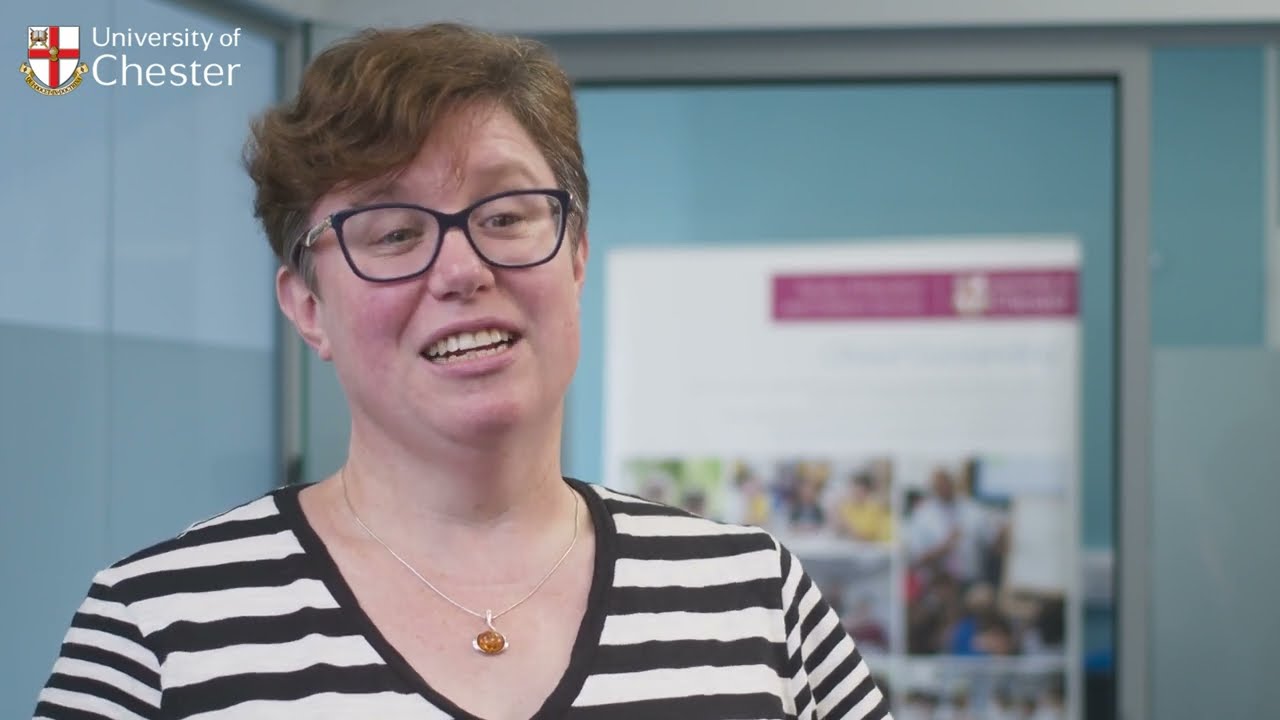Special Educational Needs and Disability (SEND) MA/PGDip/PGCert
.jpg)
- Level
- Postgraduate
- UCAS Code
- N/A
- Start date
- Apr 2025, Sept 2025, Jan 2026
- Duration
- 2 years
- Location
- Exton Park, Chester/Online
- UK fees
- £5,850 for the full course (2025/26) More on UK fees
You are viewing Course summary
Part-time PG Education Online Information Event
Join our online information event to find out more about our part-time Childhood, Education, and Professional Development (CEPD) postgraduate courses.
Course Summary
What if every child and young person with Special Educational Needs and Disability (SEND) had the support they needed to thrive? Do you wonder how we can break down barriers to inclusion and create real change in education and beyond? Our SEND course options will help you make a difference and develop the expertise to advocate, innovate, and lead in the field of special educational needs and disability.
Our SEND options are designed to meet the interests of a wide range of learners from schools, nurseries, universities, colleges and local authorities, as well as professionals working with children and young people in a variety of roles – for example in children's services and informal educational settings. Our courses are designed to reflect current and future trends in SEND, so will equip you with the skills and knowledge to work with and support children and young people with special educational needs. The MA/PGDip/PGCert in Special Educational Needs and Disability (SEND) will be a perfect fit for you if you have the desire to make a real difference to the outcomes of the children and young people with whom you work. On this course, you will have the chance to study across a range of different modules.
If you wish to focus on a specific learning difficulty – namely, Dyslexia – you might want to check out our MA/PGDip/PGCert in Special Educational Needs and Disability (SEND) with Specific Learning Difficulties (SpLD). On this course, the curriculum will be comprised of specific, focused modules, and your final 60 credit research project will be in the field of dyslexia. This course has the option to gain additional external professional qualifications related to dyslexia.
Sitting within the University's School of Education, our MA/PGDip/PGCert in Special Educational Needs and Disability (SEND) course analyses both the historical and current SEND landscape, investigating the factors which have contributed to an increase in the numbers of children and young people being identified as having special educational needs and disabilities (DfE, 2024). In addition, the course will equip you to evaluate current practice within your own work setting and will help you determine strategies to support children and young people to fulfil their potential and make a successful transition into adult life.
Drawing on the latest policy, research and practice in SEND, this course will equip you with skills in critical evaluation and practitioner research, enabling you to make informed contributions to development in policy and practice. Our diverse student body with practitioners from different professional backgrounds facilitates discussion, debate and the sharing of experiences in a supportive and welcoming environment. You will also learn from staff who are experts in their field and are actively involved in the field of SEND.
Our course focuses on subject areas such as neurodiversity, mental health and inclusive practice and more. The learning on our course will give you the knowledge and understanding of the key issues within the special educational needs and disability sector, whilst increasing confidence to be able to advocate for learners and their families.

MA Special Education Needs and Disability - University of Chester
What You'll Study
The full three-year MA course consists of six 20-credit modules and a 60-credit research project in an area of special educational needs and disability of your choosing. There are two entry points: September and January.
MODULES
- ED7301 – Special Educational Needs and Disability (SEND): Evaluating Policy and Practice (20 Credits) Core: Through an interdisciplinary lens, you'll explore the sociocultural, political, and legislative frameworks surrounding SEND and develop a critical understanding of disability discourse, policy implications, and practical strategies for supporting individuals. You'll engage with both historical and contemporary SEND policies, critically evaluate the evolution of statutory and legislative contexts, and explore sociocultural constructions and perceptions of disability. You'll then investigate how these (and other) factors have influenced practice within professional settings.
- ED7311 – Specific Learning Difficulties: Identification, Intervention and Teaching (20 Credits) Optional: You'll critically examine definitions and causal theories of dyslexia, evaluating cognitive, neurological, and environmental influences. Engaging with contemporary debates, you'll contrast typical language, literacy, and numeracy development with trajectories affected by dyslexia. A key focus is on specialist, multisensory teaching methods, enabling you to design, implement, and evaluate tailored support strategies. This practical approach equips you with the expertise to enhance learning outcomes in diverse educational settings.
- ED7321 – Embracing Neurodiversity in Education and Beyond (20 Credits) Optional: You'll engage with key debates on neurodiversity, challenging assumptions and exploring its impact on identity and lived experience. Through a critical lens, you'll examine diagnostic labels and their societal implications while centring neurodiverse voices. A key focus is on evaluating neurodiversity-affirming practices in education and workplaces, equipping you with the knowledge and skills to advocate for inclusion, equity, and empowerment in both professional and personal contexts.
- ED7302 – Critical Approaches to Inclusive Practice (20 Credits) Core: You'll critically explore theories, models, and policies that shape inclusive practices, evaluating their effectiveness in addressing systemic inequities. Reflecting on personal and professional experiences, you'll assess strengths, identify areas for growth, and analyse case studies to uncover opportunities for innovation. With a strong focus on advocacy, you'll develop strategies to promote inclusion in diverse settings, equipping you with a greater ability to drive meaningful change and foster equitable environments.
The information listed in this section is an overview of the academic content of the course that will take the form of either core or option modules and should be used as a guide. We review the content of our courses regularly, making changes where necessary to improve your experience and graduate prospects. If during a review process, course content is significantly changed, we will contact you to notify you of these changes if you receive an offer from us.
MODULES
- ED7312 – Diagnostic Approaches to Assessing Specific Learning Difficulties (20 Credits) Optional: You'll conduct and interpret diagnostic assessments for learners with a specific learning difficulty (SpLD), using data to inform targeted interventions. Engaging with current theory and evidence-based practices, you'll explore the relationship between cognitive profiles and attainment in literacy and numeracy. A strong focus on reflective practice will encourage you to critically evaluate and adapt your teaching strategies, ensuring more effective, personalised support for diverse learners.
- ED7322 Attachment Relationships & Trauma-Informed Practice (20 Credits) Optional: This module delves into the complex interplay between attachment, trauma, and human development, examining how early experiences shape behaviour and well-being. You'll explore key theories of attachment, the neurobiological impact of trauma, and the wider influence of socio-economic and cultural factors. With a strong focus on trauma-informed practices, you'll critically assess current approaches, gaining the insight needed to apply effective, research-led strategies in professional settings.
- ED7313 – Specialist Diagnostic Assessment and Support for Specific Learning Difficulties (20 Credits) Optional: You'll enhance your expertise in diagnostic assessment and become equipped to communicate findings clearly and make practical, evidence-based recommendations. You'll explore formal reporting structures, tailoring support strategies for education and the workplace. Examining co-occurring conditions, cultural influences, and the impact of diagnostic labels, you'll develop a nuanced understanding of the assessment process. Legal, ethical, and professional responsibilities will also be considered, preparing you for informed, responsible practice.
- ED7323 – Mental Health and Resilience (20 Credits) Optional: You'll explore the complexities of mental health and resilience, critically examining key theories, risk factors, and protective mechanisms that shape well-being. Through real-world case studies and research, you'll analyse the impact of mental health challenges and assess contemporary resilience-building strategies. A strong focus on professional practice will highlight the importance of ethical support, self-care, and maintaining boundaries, and you'll gain expert knowledge in fostering resilience in diverse settings.
- ED7208 – Research Methods and Design (20 Credits) Core: This module provides a comprehensive introduction to research methods and design, equipping you with essential skills for conducting rigorous and impactful research. You will explore a range of different approaches to conducting research, gaining practical experience in research planning, data collection, and ethical considerations. Emphasis is placed on selecting appropriate research designs for various questions and contexts. By the end of the module, you will be prepared to independently design and execute research projects that contribute meaningfully to your field of study.
The information listed in this section is an overview of the academic content of the course that will take the form of either core or option modules and should be used as a guide. We review the content of our courses regularly, making changes where necessary to improve your experience and graduate prospects. If during a review process, course content is significantly changed, we will contact you to notify you of these changes if you receive an offer from us.
MODULE
- ED7210 – Research Project (60 Credits) Core: This module offers you an opportunity to undertake an independent research project in an area related to your final award. Through this module, you will develop critical research skills by designing, conducting, and presenting a research study that addresses a significant area of professional interest. This module encourages you to make a meaningful contribution to the field while honing skills essential for research, critical thinking, and current/future professional practice.
The information listed in this section is an overview of the academic content of the course that will take the form of either core or option modules and should be used as a guide. We review the content of our courses regularly, making changes where necessary to improve your experience and graduate prospects. If during a review process, course content is significantly changed, we will contact you to notify you of these changes if you receive an offer from us.
The MA SEND has been structured to integrate with the work patterns of busy professionals. As most participants will be teachers or other educational professionals, the teaching is concentrated into six Saturdays each year on site, supplemented by six online evening seminars. These are spread across the academic year with two on site and two online sessions per module studied.
In addition to this direct contact, you should expect to spend time each week on independent study, which might include following asynchronous learning material on the University's VLE, tutorial time with staff, using the University's library, and preparing work for assessment.
The blend of students from different professional backgrounds enables discussion, debate and the sharing of experiences in a supportive and welcoming environment, facilitated by staff who are experts in the field of special educational needs and disabilities.
All assessments in this course are designed using authentic assessment methods, ensuring real-world relevance and application. You will engage in meaningful tasks that mirror professional challenges, fostering deeper understanding, critical thinking, and practical skills that directly translate to your area of employment. The MA SEND uses a variety of assessment methods, including presentations, reports, projects, and critical reflections, which will enable you to apply the topics studied to your own area of interest/background and to the age phase in which you are working.
Beyond the Classroom
There'll be an opportunity to network with a range of professionals from different backgrounds.
Entry Requirements
2:2 honours degree
A 2:2 honours degree in an area broadly related to education, and/or special educational needs. Those with a degree in a different area but with experience of working in an educational setting with children/young people with special educational needs and disabilities will also be considered. Applicants without an undergraduate degree but with significant experience of working with children/young people with special educational needs and disabilities may be considered and will be invited for interview.
Minimum requirement IELTS Level 6.5. Please refer to the international entry requirements for more details.
English Language Requirements
For those who do not have IELTS or an acceptable in-country English language qualification, the University of Chester has developed its own online English language test which applicants can take for just £50.
For more information on our English language requirements, please visit International Entry Requirements.
Fees and Funding
£8,775for a full-time course (2025/26)
Guides to the fees for students who wish to commence postgraduate courses are available to view on our Postgraduate Taught Programmes Fees page. Here you will also find information about part-time fees and project/placement year fees.
Your course will involve additional costs not covered by your tuition fees. This may include books, printing, photocopying, educational stationery and related materials.
Students who wish to study the optional modules in the assessing of Specific Learning Needs will be required to source their own assessment kits, under guidance from the programme leader. This could lead to costs of up to £2,500.
Please note that students who wish to apply for certification will be subject to an additional cost for membership from the British Dyslexia Association, PATOSS or SASC.
Your Future Career
Job Prospects
Previous graduates have been promoted within their institutions or gone on to work in others. Some have left to work independently and others to work in advisory capacities within the LEAs and other educational institutions.
Careers Service
The University has an award-winning Careers and Employability service which provides a variety of employability-enhancing experiences; through the curriculum, through employer contact, tailored group sessions, individual information, advice and guidance.
Careers and Employability aims to deliver a service which is inclusive, impartial, welcoming, informed and tailored to your personal goals and aspirations, to enable you to develop as an individual and contribute to the business and community in which you will live and work.
We are here to help you plan your future, make the most of your time at University and to enhance your employability. We provide access to part-time jobs, extracurricular employability-enhancing workshops and offer practical one-to-one help with career planning, including help with CVs, applications and mock interviews. We also deliver group sessions on career planning within each course and we have a wide range of extensive information covering graduate jobs and postgraduate study.











